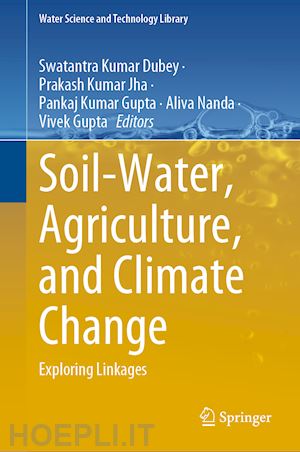
Questo prodotto usufruisce delle SPEDIZIONI GRATIS
selezionando l'opzione Corriere Veloce in fase di ordine.
Pagabile anche con Carta della cultura giovani e del merito, 18App Bonus Cultura e Carta del Docente
Dr. Prakash Kumar Jha is currently working as a postdoctoral researcher at the Feed the Future Sustainable Intensification Innovation Lab (SIIL), Kansas State University, USA. He is a crop modeler with interest in sustainable agricultural systems. His specific research interests focus on investigating the influence of agronomic management on crop growth and development from field to ecological scale. He investigates complexities in agricultural systems, integrating crop simulation models, remote sensing, and climate forecast to formulate decision support systems for better management strategies at multiple scales of agroecosystems. He is passionate about teaching and the opportunity to mentor students interested in sustainable agricultural landscapes and fundamentals of digital agroecosystems. He has published more than 20 research papers and has reviewed several research articles for reputed journals like, Agricultural Systems, Agronomy, Agronomy Journal, Computers and Electronics in Agriculture, Crop and Pasture Science, Environmental Modeling & Software, Environmental Research Letters, Nature sustainability, Plant Methods, Plants, Scientific Reports, Sustainability, Water, and others.
Dr. Pankaj Kumar Gupta is a contaminant hydrogeologist, after having completed his Ph. D from IIT Roorkee, he has been a Postdoctoral fellow at the University of Waterloo, Canada. Recently he has been awarded prestigious Ramanujan fellowship of the SERB (Govt. of India). The majority of his works focus on two areas: (1) understanding the soil moisture flow and pollutant mobility into soil-water systems and (2) developing water resource, pollution management strategies. Dr Gupta holds his in depth experience of incorporating novel technologies (viz. geophysical investigations, groundwater modelling, aquifer mapping and water quality assessment etc.) to map aquifers of 30+ sites in India. He also teaches and guides master and Ph. D students with diversified knowledge. He has received an AGU Travel Grant (2017), JPGU Travel Grant (2018), and EXCEEDSWINDON and DAAD Germany Grant (2018). He serves as an editorial board member for SN Applied Sciences, Biochar, Carbon Research and Frontiers in Water journals. He has published more than 20 research papers, approximately 30 book chapters, edited 2 books and two popular science articles. He has reviewed several research articles for reputed journals including RSC Advances, Groundwater for Sustainable Development, ASCE JEE, ASCE Irrigation and Drainage, Env. Sc, Pollution Research, Eco-hydrology, Journal of Contaminant Hydrology, etc. Further, he has led many sites restoration and remediation consultancy projects at polluted industrial sites in India. He is core-member of the society of young agriculture and hydrology scholars of India (www.syahindia.org), a network of early-career researchers from the globe.
Dr. Aliva Nanda is currently working as a postdoctoral researcher at Sierra Nevada Research Institute, University of California, Merced, USA. Her research expertise includes understanding runoff generation mechanisms, pathways, and thresholds at micro- to macro-scale, modeling efficient irrigation systems, and optimizing irrigation efficiency. She is also exploring the ecohydrological processes of the forested catchment. Dr. Nanda graduated from the Indian Institute of Technology Roorkee, India. During her Ph.D., she has done extensive field studies to understand the hydrological processes of the Himalayan landscapes. Her Master’s and Bachelor’s degree are i











Il sito utilizza cookie ed altri strumenti di tracciamento che raccolgono informazioni dal dispositivo dell’utente. Oltre ai cookie tecnici ed analitici aggregati, strettamente necessari per il funzionamento di questo sito web, previo consenso dell’utente possono essere installati cookie di profilazione e marketing e cookie dei social media. Cliccando su “Accetto tutti i cookie” saranno attivate tutte le categorie di cookie. Per accettare solo deterninate categorie di cookie, cliccare invece su “Impostazioni cookie”. Chiudendo il banner o continuando a navigare saranno installati solo cookie tecnici. Per maggiori dettagli, consultare la Cookie Policy.